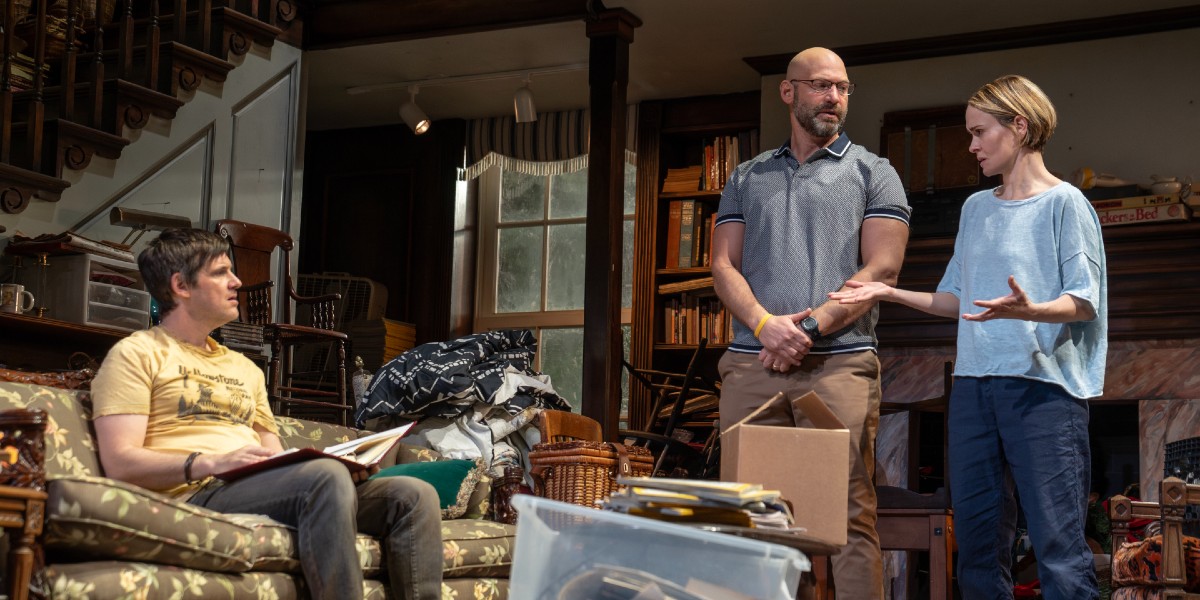Learn about all the family dramas on Broadway this season
Each play in the genre is just as unique as any given family, as evidenced by this spring's star-studded shows Mother Play, Appropriate, and Uncle Vanya.
Family trees are in bloom on Broadway this spring. Beginning with Joshua Harmon’s Prayer for the French Republic at the top of the year, numerous family dramas have proved the staying power of the fertile, timeless genre. Not to mention, these shows' families include the likes of actors Steve Carell, Jessica Lange, and Sarah Paulson.
Playing right now are Paula Vogel’s Mother Play at the Hayes Theater; Anton Chekhov’s Uncle Vanya, freshly translated by Heidi Schreck, at the Vivian Beaumont Theater; and Branden Jacobs-Jenkins's Appropriate at the Belasco Theatre.
Exploring one family’s dynamics illuminates universal themes of love, loss, legacy, and identity. Just as every family is unique, every playwright’s reasons for writing and approach to a family story is, too. Diving into the complicated topic of family is “mandatory for all of us playwrights,” Vogel said.
The writers of the three family dramas running right now shared their approaches to the genre and what audiences can expect from their shows.
Get Broadway play tickets on New York Theatre Guide.

Mother Play honors the history of family dramas
In 1962 D.C., single mother Phyllis (Jessica Lange) and her teenage children Martha (Celia Keenan-Bolger) and Carl (Jim Parsons) move into a new apartment. Mom’s fixed notions about who her kids should be collide with their visions, creating a situation ripe for dysfunction.
The plot sketch of Paula Vogel’s play can be compared to The Glass Menagerie, which centers on harsh matriarch Amanda and her long-suffering children, Laura and Tom. It should be.
“The play is very much an homage to Tennessee Williams,” said Vogel, adding that it also nods to Paul Zindel’s drama The Effect of Gamma Rays on Man-in-the-Moon Marigolds, in which a mother tries to thwart her daughter's academic success.
Vogel said her new work is “loosely autobiographical.” As she reflected on her life, she found more than pretty sepia photographs. “Part of the memory is also the rats and the cockroaches,” she said.
Life’s icky elements are what dramas are made of. Vogel’s Pulitzer Prize-winning play How I Learned to Drive is about an abusive uncle. In her new work, she wanted to “look back on what motherhood felt like for me, as a child going through the ’50s, ’60s, and ’70s.”
“There’s a huge difference in the trajectory of what's possible for me as a woman and what was possible for my mother as a woman,” Vogel added. “That is why this play very directly expresses what happens for women who cannot get abortions. What happens to the structure of the family when that is true is one of the elements in this play.”
Vogel was determined to tell a story outside the realm of wealth. “By portraying American life as an upper-class existence, we are not allowing ourselves to understand the motivations for working-class women who have to survive. Our notion of morality and women is all based on a first-world notion of luxury and ease and choices.”

Appropriate experiments with the age-old genre
In Appropriate, family members reunite at their Arkansas estate to settle their late father's affairs. Tensions escalate as siblings Toni (Sarah Paulson), Bo (Corey Stoll), and Franz (Michael Esper) uncover a disturbing legacy of racism and violence that challenges their ideas of identity and morality.
“Family is fertile dramatic territory, especially in an American context,” said Jacobs-Jenkins. “A theatre history book I read said that America’s greatest contribution to the Western form is the family drama – that somehow we’re the country that perfected it. The theory is that every psychological piece of warfare happens on the map of the family.”
War is definitely waged in Appropriate, which premiered off Broadway in 2014. When Jacobs-Jenkins began writing his family drama, he was trying to figure out a way to put his own stamp on the genre.
"It was actually an amazing experience,” he said, “because I wound up forcing myself to read all these extraordinary plays.”
One was Eugene O’Neill’s Long Day’s Journey Into Night. “Early on when I was working for a while and couldn't start the play, I made a Word document where I stole everything,” he said. One of Toni's Act 2 speeches, delivered from a staircase in Appropriate, borrows from matriarch Mary Tyrone’s drug-addled address at the end of Long Day’s Journey. “There’s no greater monologue,” Jacobs-Jenkins said.
“I started the project very cynically,” he continued. “But family dramas are an option for playwrights to really unpack their own sense of self and what makes a person a person.” Jacobs-Jenkins, who’s Black, wrote about a family that’s white as “an experiment for me to see what would happen” and how it would be received.
Appropriate was warmly welcomed into the Broadway family. Its first run at the Hayes Theater in winter 2023 extended, and popular demand moved the show to the Belasco for an encore.

Uncle Vanya is a playwright's personal passion project
First performed in 1899, Uncle Vanya centers on a Russian family estate run by Vanya (Steve Carell) and his niece Sonia (Alison Pill), whose lives have become exhaustingly routine. The arrival of Sonia’s father, Serebryakov (Alfred Molina), and his young wife, Yelena (Anika Noni Rose), awaken feelings of love, jealousy, and resentment.
“I have loved this play for 30 years,” said Schreck, who speaks, reads, and writes Russian. “I have a long history with it.” Hunkered down during the pandemic, Schreck thought about the play's “poor, beautiful, messed-up characters who are trapped with one another.” It's easy to see how the author would be intrigued.
Schreck’s breakthrough 2019 play, the multi-Tony Award-nominated What the Constitution Means to Me, was all about her own history and its entanglement with America's. Just as audience members saw themselves in her story, Uncle Vanya reaches beyond the play’s property lines.
“The power dynamics in Vanya and Sonia’s family are a reflection of something larger,” said Schreck. “It’s clear that the family environment is a microcosm of the entire culture.”
There’s nothing like awakening new insights from something you already love. Schreck said she’s “very fascinated” with the ghost of Vera, Serebryakov’s deceased wife. “Vera’s absence is felt by every character,” she said. “This is a grieving family, and I don't know that I would have said that before I started working on it.”
Translating Uncle Vanya has had unexpected, life-affirming effects for Schreck, who’s married with 3-year-old twins. To prepare for her translation, she reread Janet Malcolm’s book Reading Chekhov.
“She points out that in Chekhov’s stories, and implicitly in many of his plays, there's a refrain that life is only given to us once,” said Schreck. “Having that mantra every day while working on this made me deeply appreciate the time I get to be alive.”
Originally published on




